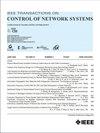Q-DADAM: A Quantized Distributed Online Optimization Algorithm With Adaptive Momentum
IF 4
3区 计算机科学
Q2 AUTOMATION & CONTROL SYSTEMS
引用次数: 0
Abstract
This article investigates distributed online optimization for a group of agents communicating on undirected networks. The objective is to collaboratively minimize the sum of locally known convex cost functions while overcoming communication bandwidth limitations. To tackle this challenge, we propose the Q-DADAM algorithm, a quantized distributed adaptive momentum method that ensures that agents interact with neighbors to optimize the global cost function collectively. Unlike many existing distributed online optimization algorithms that overlook communication bandwidth constraints, the Q-DADAM algorithm involves random quantization to effectively reduce the data transmission volume, making it more practical for applications with limited channel capacity. Different from existing algorithms that neglect adaptive momentum methods, the Q-DADAM algorithm incorporates these adaptive momentum methods, contributing to improved convergence and superior performance. Theoretical analysis demonstrates that the Q-DADAM algorithm with appropriate step size and quantization level can reduce communication traffic and achieve sublinear dynamic regret. Simulation experiments validate the practicality and effectiveness of the Q-DADAM algorithm. In addition, we discuss the impacts on the convergence of the Q-DADAM algorithm under different quantization levels and the number of agents.Q-DADAM:一种具有自适应动量的量化分布式在线优化算法
本文研究了在无向网络上通信的一组代理的分布式在线优化。目标是协作最小化局部已知凸代价函数的和,同时克服通信带宽限制。为了解决这一挑战,我们提出了Q-DADAM算法,这是一种量化的分布式自适应动量方法,可以确保代理与邻居交互以共同优化全局成本函数。与许多现有的忽略通信带宽限制的分布式在线优化算法不同,Q-DADAM算法通过随机量化来有效减少数据传输量,使其更适用于信道容量有限的应用。与现有算法忽略自适应动量方法不同,Q-DADAM算法结合了这些自适应动量方法,提高了收敛性,提高了性能。理论分析表明,适当步长和量化水平的Q-DADAM算法可以减少通信流量,实现亚线性动态遗憾。仿真实验验证了Q-DADAM算法的实用性和有效性。此外,我们还讨论了不同量化水平和agent数量对Q-DADAM算法收敛性的影响。
本文章由计算机程序翻译,如有差异,请以英文原文为准。
求助全文
约1分钟内获得全文
求助全文
来源期刊

IEEE Transactions on Control of Network Systems
Mathematics-Control and Optimization
CiteScore
7.80
自引率
7.10%
发文量
169
期刊介绍:
The IEEE Transactions on Control of Network Systems is committed to the timely publication of high-impact papers at the intersection of control systems and network science. In particular, the journal addresses research on the analysis, design and implementation of networked control systems, as well as control over networks. Relevant work includes the full spectrum from basic research on control systems to the design of engineering solutions for automatic control of, and over, networks. The topics covered by this journal include: Coordinated control and estimation over networks, Control and computation over sensor networks, Control under communication constraints, Control and performance analysis issues that arise in the dynamics of networks used in application areas such as communications, computers, transportation, manufacturing, Web ranking and aggregation, social networks, biology, power systems, economics, Synchronization of activities across a controlled network, Stability analysis of controlled networks, Analysis of networks as hybrid dynamical systems.
 求助内容:
求助内容: 应助结果提醒方式:
应助结果提醒方式:


